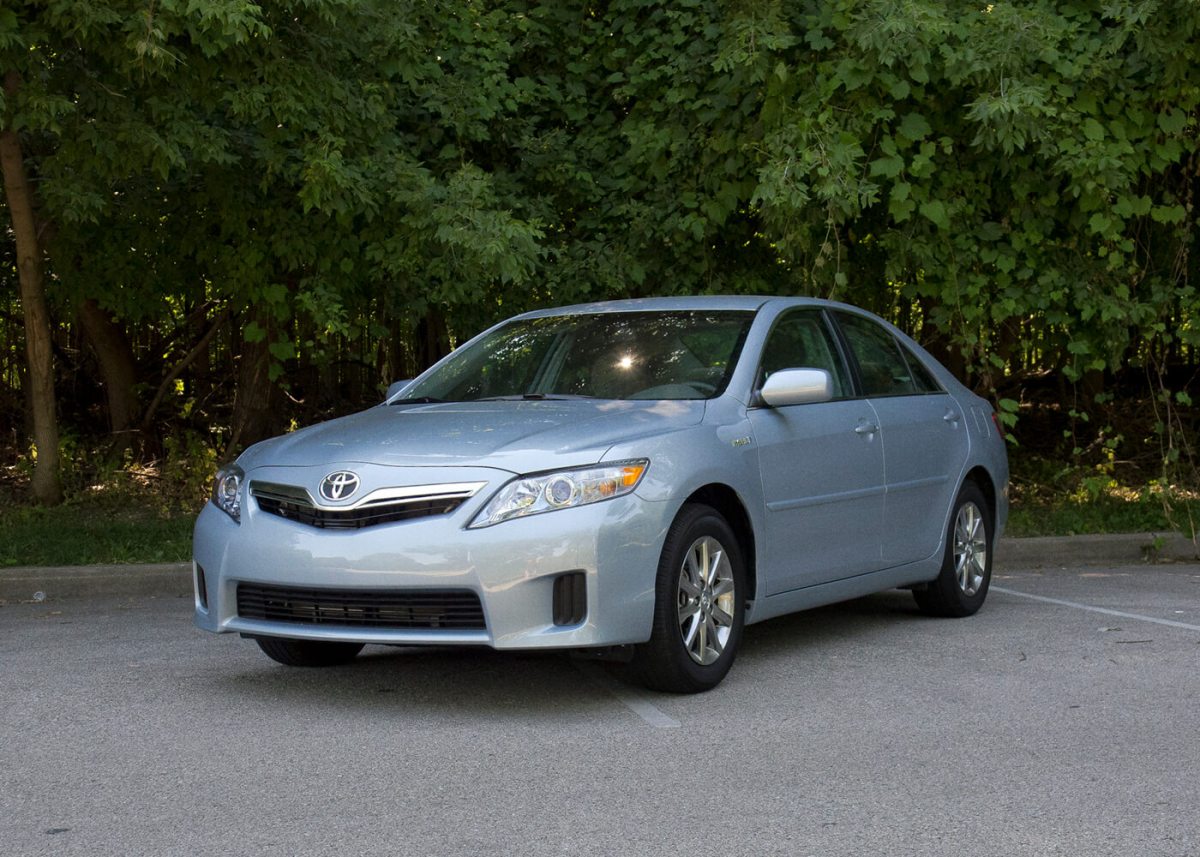
The Toyota Camry Hybrid is the forgotten hybrid, and it probably ought to stay that way.
Like the regular Camry, the hybrid is a perfectly pleasant midsize sedan — equipped similarly to the top, XLE Camry trim level. The problem is its mileage: an EPA-estimated 31/35 mpg city/highway. A similarly refined hybrid sedan, the Ford Fusion Hybrid, outpaced it in 2009 (as an early 2010 model) with 41/36 mpg, as do new hybrid versions of the Hyundai Sonata and Kia Optima (35/40 mpg), for considerably less money. If high mileage is your main goal, the Toyota Prius delivers 51/48 mpg for thousands less in midsize hatchback form.
2011 Midsize Hybrid Car Mileage
Base list price City/highway mpg Combined mpg
Toyota Camry Hybrid $27,050 31/35 33
Ford Fusion Hybrid $28,600 41/36 39
Hyundai Sonata Hybrid $25,795 35/40 37
Hyundai Sonata $19,395* 22/35 26
(non-hybrid, automatic)
Toyota Prius $23,520 51/48 50
*Most affordable version; comparably equipped SE trim level is $22,795.
Source: Manufacturers, EPA
As the table reflects, the non-hybrid Sonata gets an estimated 35 mpg highway as well, a level we expect to see in more gas-only midsize cars.
If the car’s mileage versus price comparison doesn’t dissuade you, be aware that Toyota is about to replace the Camry with a complete redesign for 2012. More efficient versions of the hybrid and non-hybrid are all but a certainty.
What You Get
Still reading? If so, you might still be considering a 2011 Camry Hybrid, which is a questionable but not necessarily terrible proposition: As older generations are ushered out to make room for new and improved ones, there are usually deals to be found. Granted, Camry Hybrid mileage doesn’t live up to that of other new hybrids, but it’s still better than a non-hybrid. If you’re shopping for a regular Camry and find a discounted hybrid, why not take it? Here’s what you get:
I like the 2011 hybrid’s acceleration over that of the Prius. Though the drivetrain is similar overall, the Camry uses a 2.4-liter four-cylinder rather than a 1.8-liter. In concert with two motor-generators and a nickel-metal-hydride battery pack, the Camry Hybrid accelerates with more authority and less of a lag after you nail the go-pedal. Nothing comes for free, though, and this decent pep is partly why the car’s mileage isn’t higher.
For those keeping score, in 2011 the car’s mileage rating went to 31/35 — 33 mpg (city/highway — combined) from 33/34 — 34 mpg, where it had been since its 2007 debut. A change in the EPA test cycle is solely responsible. The car hasn’t changed since the 2010 model year, so shoppers may consider 2010 models as well. Also note that the Camry is unique among Toyota hybrids in that its city mileage is lower than its highway mileage, giving the Fusion an even greater advantage.
The Fusion has a similar acceleration feel along with its higher mileage, while the Korean models’ use of conventional multigear automatic transmissions makes them feel a little more natural. The Camry Hybrid’s reliability has been above average, while the Fusion Hybrid’s has been top-rated.
What You Give Up
The specifications don’t show everything you’d sacrifice by buying the outgoing Camry Hybrid. The car’s interior appears outdated, especially when compared with the Sonata and Optima. Though our test car had an optional touch-screen navigation system with power-flow and efficiency-history displays, its graphics show the unit’s age. More notably, the only display among the otherwise high-quality gauges is a crude monochrome affair that shows power flow, a trip computer and such. The Ford, Hyundai and Kia hybrids have full-color, high-resolution LCDs instead.
If you’re new to hybrids, note that you’ll surrender other features you’ve come to take for granted: For one, braking is substandard for the genre as a whole — nonlinear with disconnected pedal feel. Also, to date no hybrid sedan has retained a fully functioning folding rear seat: Some have eliminated it entirely, and most — including the Camry Hybrid — have only a pass-through doorway, typically raised and atypical in shape. Only hatchback hybrids have traditional folding backseats with full width and height.
Safety
According to Insurance Institute for Highway Safety crash ratings, the 2011 Camry also falls behind in one test: Rear-impact protection is rated Marginal, two steps below the top rating, Good, boasted by the Fusion, Sonata and Optima. The Camry does, however, get top ratings for frontal, side and rollover protection.
Standard safety equipment includes front, front-seat side-impact and side curtain airbags. Antilock brakes and an electronic stability system with traction control are also included.
Camry Hybrid in the Market
Today’s used cars are so good and last so long it’s hard to deem any vehicle obsolete. But as new cars go, the 2011 Toyota Camry Hybrid is about as close as they come. It had an impact when it first hit the market, but it’s been surpassed by comparable hybrids and is even rivaled in some driving cycles by non-hybrids. Who will buy it? I suspect bargain-seekers and people who don’t do their research and want a hybrid, with no regard for what they get in return.
Snapshot:
Starting MSRP $27,050
MPG
City: 31
Highway: 35
Available Engines
147-hp, 2.4-liter I-4 (gas hybrid)
Transmissions
2-speed CVT w/OD
New or Notable
• Gas/electric hybrid
• Compares to Camry XLE
• Seven airbags
• 100,000-mile warranty for hybrid components
What We Like
• Better acceleration than Prius
• Above-average reliability
• Overall refinement
• Gas mileage vs. non-hybrid
What We Don’t
• Low mpg for hybrid sedan
• Braking feel
• Outdated interior
• Trunk size
• Small trunk pass-through
• Side mirrors don’t fold


































